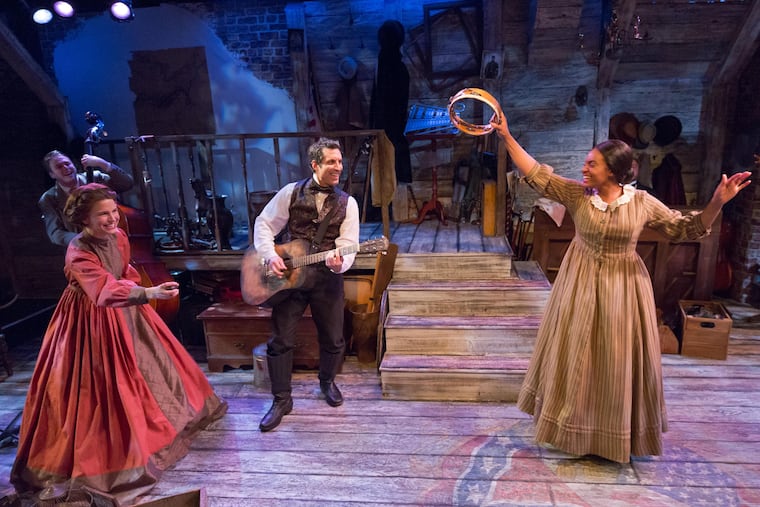’Civil War Voices’ at the Walnut Street: Creaky — except when they sing
If this production is too static and bland to work as a play, it is very entertaining when the stars do what they came to do: Sing the songs of the era. Then we learn of the lives of those who lived through the conflict.

Walnut Street Theatre’s decision to stage James R. Harris’ Civil War Voices at its Independence Studio on 3 through May 25 seems a shrewd calculation. I can imagine busloads of schoolchildren, perhaps fresh from a visit to the National Constitution Center a few blocks away, crowding into the intimate venue to learn something about this fraught chapter of U.S. history. What appeal the show holds for adult theatergoers who presumably passed sixth-grade social studies remains more of a mystery.
Harris crafted the overlong play-with-music after discovering the diary of his great-great-uncle Joseph, an Alabama plantation owner who nominally fought for the Confederacy. We learn during the show that the elder Harris, like many wealthy and connected men, paid a substitute to deploy in his place.
As for the current Harris, he’s a lawyer by trade, and it quickly becomes clear he’s no playwright. Although the piece contains several intersecting plot points, the storytelling largely emerges through direct-address narration from an authorial stand-in, played by the rich-voiced Nichalas L. Parker.
The additional cast members portray a host of historical figures, including Elizabeth Keckley, an enslaved woman who purchased her own freedom and eventually became confidante to Mary Todd Lincoln; and Joshua Lawrence Chamberlain, a college professor who joined the Union Army and served a term as governor of Maine. The ensemble brims with local talent, including the reliably excellent Jessica Johnson and Damon Bonetti, and Matthew Mastronardi doing yeoman’s service as both actor and musical director.
Yet under Bill Van Horn’s direction, the proceedings often resemble a diorama come to life. The dialogue sounds hollow and overly explanatory, and is frequently filled with trite platitudes you might expect to read on a museum placard. Andrew Thompson’s distressed-wood set, embedded with multiple images of the Union and Confederate flags, offers another heavy dose of bland Americana.
Harris doesn’t shy away from the horror of war, but he can’t help infusing the evening with a dash of apology — particularly with regard to his ancestor (Ben Sheppard, whose Southern accent comes and goes throughout the performance). Joseph questions the morality of secession, but his reservations don’t extend so far that he divests himself from the economic system built on bondage. Similarly, the portrait of Theo and Harriet Perry (Mastronardi and Laura Giknis), a young couple separated during the conflict, largely elides their ardent defense of slavery.
The most compelling moments come when the company makes music. It’s a treat to hear them perform without amplification, accompanying themselves on more than a dozen instruments. (Mastronardi plays a mean cello.) And in the case of Keckley, Johnson weaves an intricate portrait of an extraordinary woman simply through song. The degradation of being considered property (“Sometimes I Feel Like a Motherless Child”) gives way to the ebullience of emancipation (“Didn’t My Lord Deliver Daniel?”), and we come away with a rich understanding of all she endured in her long life.
Theater
Civil War Voices
Through May 26 at Walnut Street Theatre’s Independence Studio on 3, 825 Walnut St. Tickets: $40. Information: 215-574-3550, walnutstreettheatre.org.